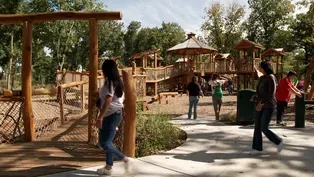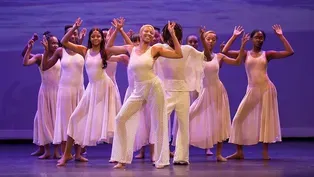
Harry Smith
Clip: Season 2 Episode 205 | 8m 59sVideo has Closed Captions
Join a conversation with retired national TV reporter Harry Smith.
Harry Smith is an award-winning national television reporter. He’s returning to his alma mater, Central College, in his retirement to teach a course in curiosity.

Harry Smith
Clip: Season 2 Episode 205 | 8m 59sVideo has Closed Captions
Harry Smith is an award-winning national television reporter. He’s returning to his alma mater, Central College, in his retirement to teach a course in curiosity.
How to Watch Iowa Life
Iowa Life is available to stream on pbs.org and the free PBS App, available on iPhone, Apple TV, Android TV, Android smartphones, Amazon Fire TV, Amazon Fire Tablet, Roku, Samsung Smart TV, and Vizio.
Providing Support for PBS.org
Learn Moreabout PBS online sponsorship[Hoda Kotb] After 12 years at NBC News, this man down here at the end of the couch, Harry Smith, is moving on.
Ah, Harry.
What's next, Harry?
[Harry Smith] So, I am going back to my alma mater, Central College in Pella, Iowa and I'm going to teach a course this fall.
Can I sign up?
[Harry Smith] On curiosity.
Oh!
♪♪ For nearly 40 years, journalist Harry Smith was a mainstay on American network television telling stories across the world for CBS and NBC.
But before that, he was a theatre and communications major at Central College.
♪♪ [Nebbe] What brought you to Central College?
Because you grew up in Illinois.
And you have said that you were not particularly an engaged student in high school.
[Harry Smith] I'm the youngest of eight children, but I was that kid who sat in the front of the classroom like this falling asleep and found questions on tests ambiguous and I didn't do homework much.
I wanted to be a cross country truck driver.
That was what I thought, because I knew I wanted to see America.
Senior year comes along, I had a very good senior year playing football and they said, you need to get straight A's, so I got straight A's and did whatever I needed to do to get into college.
[Nebbe] So you could keep playing football.
[Harry Smith] Yeah, yeah.
[Nebbe] You talk about how you were basically just a Roman candle waiting to be lit.
What happened when you got to college that set you on fire?
[Harry Smith] Professors and coaches.
I got the idea when I was in college that I could write a little bit.
I couldn't, but I had the idea that I could.
And my senior year I lived off campus in a really bad trailer in a really nasty part of Pella.
I know, it's kind of, that's an oxymoron.
But it was just out there somewhere.
And there was a brand new English professor who lived next door and for reasons I don't understand to this day, I would write all this stuff on a legal pad and say, would you look this over?
And he said, sure.
And I would get it back a couple of days later and it was filled with red ink, just seas of red ink.
And that was really instructional.
And I just kept thinking, I have some, I bet I can do this.
♪♪ [Nebbe] After college, Harry moved to Denver where he worked for more than a decade in local news before joining CBS and later NBC News as a reporter and anchor.
Throughout those jobs, Harry recognized the importance of being curious and made it his mission to teach others to keep their eyes open to the world around them.
[Harry Smith] So, at NBC we had a writing class that met a couple of times a year.
There was a waiting list to get in.
And one day, if I were in town, they would bring me in for one day and I'd make a list and above the things it said, unless you're curious, you're in the wrong business.
You need to be insatiable in that regard.
Over the last 20 years, as we've seen at all in secondary education this notion, it's more and more narrow.
I want to study this thing so I can get this job so I can do blank so I can make this money.
It's very transactional now.
Back in the day, we came and sort of discovered stuff.
Half of the kids who go to college now will never work in the field they studied.
Half.
So, you better -- in the immortal words of Ron Burgundy in the documentary Anchorman, he said what, you better have your head on a swivel.
So, going out into the world you had better have that.
So, the title of this class is Commencement.
And the whole idea, it's the beginning, it's not the end.
So, it's just these are the things I think you need in your toolkit when you walk out the door and first among them is curiosity because you've got to be aware of the world if you're going to succeed at all.
Resiliency, listening skills, curiosity.
That is the stuff, there are building blocks of that, that you can use to walk out the door with that will not only make you a better employee, will make you a more interesting person, but in order to be interesting, you need to be interested.
♪♪ [Harry Smith] Hands of people who read the David books.
Everybody read the David books.
Awesome.
I love that.
[Harry Smith] There's a line in the book where he talks about people can be married forever and not actually see or know each other.
We're going to do something really, really, really, really radical.
So, when I was here, I took an acting class and in the acting class we used to do sensitivity exercises.
So, in the sensitivity exercises we did this, we held hands and we looked each other in the eye.
So, this is going to happen in this classroom now.
♪♪ [Harry Smith] Actually look.
Actually look.
There's things happening here.
That's great.
Everybody sit down.
♪♪ [Harry Smith] What was it like?
I'm really curious.
No joke.
I felt like it opened you up a lot more.
I've had gauge in other classes but we've never held hands and looked each other in the eye before.
(laughter) [Nebbe] You have this really amazing opportunity to connect with young people and tell them all the things you really, really want them to know.
[Harry Smith] Right.
My life has been a gift, let's be honest about it.
I am unbelievably grateful for all of the opportunities I've had.
I have been so ridiculously fortunate.
I am in the classroom, students already exceeding expectations, exceeding expectations.
Last Thursday, I almost cried five times in the classroom, seriously, because I had given this kind of ridiculously hard, almost throw away assignment.
And it was find a stanza from a Walt Whitman poem, bring it to class, read it out loud and then tell everyone in the class why and how you connect with it.
And then on and on and on through the classroom and I could barely contain my emotions.
And when the class was over I said, my heart feels like it's this big.
And I shook all their hands when they walked out the door.
Who -- I get to come back here and do that.
♪♪ [Harry Smith] Let's do a cold brew, okay?
Okay.
♪♪ [Harry Smith] One of the great things about coming here is no 20-year-old in America has ever watched one minute of network news.
So, I can come here and I'm like this, I'm like a space alien almost.
Howdy.
[Harry Smith] And when I explain to the class why I'm here and then I ask them to explain why they were in the class and they all said, because our parents told us if I were teaching a class, they'd have to take it.
[Harry Smith] I'm big with grandmas.
No, it's a thing.
You want to do it?
Yes.
[Harry Smith] Okay.
[Nebbe] You don't live in Pella now.
But you've been back to teach this course.
You've been spending a lot of time.
[Harry Smith] I live above a garage.
(laughter) [Nebbe] For eight weeks.
[Harry Smith] Probably going to be nine or ten all together.
[Nebbe] So, what do you enjoy about being here now, being a part of the community in a way that is different from flying in and out?
[Harry Smith] When I came here first as a student in 1969, I felt like I was home.
That home is where your heart is sort of thing.
This has never not been home for me in some way.
Whenever I come back here there's a whole community of people who's here to say we love you, we're glad you're back.
So yeah, I'm still living that.
I'm still very much living that sense of this is home to me.
Video has Closed Captions
The Iowa Arboretum is creating a space for people of all abilities to explore, interact and play. (5m 15s)
Video has Closed Captions
The Swan Project is a Des Moines program that offers dance lessons for Black and brown youth. (9m 1s)
Providing Support for PBS.org
Learn Moreabout PBS online sponsorship












